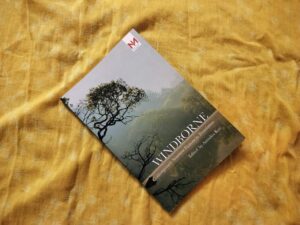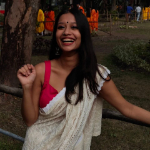BOOK REVIEW BY YASHODHARA GUPTA
“Where did we come from?
Why did we come?
Why do storms happen?
What is death? And life?”
When the children in Bipasha Bora’s ‘The People Have Forgotten Thaulipling’ ask their enaai these questions, the replies come wrapped in the comfort of make-believe. Stories. They harness the world and make sense of human chaos. Chaos becomes beautiful within the lines of a story well told. And what good is a story that doesn’t dip its feet into chaos at all?
Windborne: Contemporary Assamese Fictions in Translation is a collection that deals, inherently, with the fragments of this very chaos. After all, uncertainty is the fundamental truth of modern living, and human existence relies on a search for a definite purpose. The eleven stories dive headfirst into a contemplation of society in an aging nation that moves too quickly to notice the stagnation that festers in its heart.
Apu Bhardwaj’s ‘A Chapatti for Guti’ juxtaposes the sharpness of hunger against the misty shores of childhood longing. Guti yearns to be one with the girl of his dreams: the Amul Girl we know all too well. In these dreams, he holds her hand and realizes he is ‘fair’ and ‘fat’, far away from the drunkenness of his father and the emptiness of his stomach. The sheer naivety of the boy stands out against the superficiality of political jargon strewn about in casual conversation by the metropolitan intellectual. The banners change, as do the headlines of the current day. All that persists is Guti’s hunger, growing with each step and every word.
Angana Choudhury’s ‘An Ash-Smeared Moment’, which examines faith and failing hearts, reflects a similar sense of disillusionment. Varanasi becomes the locale, and against this holy backdrop, we find Bholenath Pandey, jalebi-shop owner, crippled in his understanding of freedom and masculinity. He is bound by the system that informs his ideas of self, and this realization forces him into the claws of absolute uncertainty. By the end, this hollowness becomes Bholenath’s only truth, leaving us with much larger questions about the human condition in a stringent world that sustains itself on absurd codes of behavior.
‘Windborne’, true to its name, takes its readers on a restless journey across lands plagued by ignorance and loneliness, prejudice and fickleness. It produces a resounding lament for the graying world we inhabit. Hope appears only to die out, as pathos commands the turn from one page to the next.
In writing ‘Barmajhili’ Sanjib Pol Deka manages to form an archive for a silenced land. He talks of the ghosts of the Nellie massacre, erased from the pages of history, condemned to the fate of national forgetfulness. Dalim Das’s ‘Hari Jadu Madhu’ explores caste hierarchies through the nuances of smell. It does not shy away from what dominant tropes term ‘ugly’- in fact, it thrives in its depictions of stench and rot, set in stone by the ghastly pallor of shame. In ‘Toadstool’, Aparna Saikia challenges the constructions of social stigma head-on, arguing that prejudice is the murkiest evil known to the modern man. Manika Devee’s ‘Tubukee’ is a heart wrenching tragedy. As simple as it is profound, the final story of this collection lands us beside an old woman and her goat. A poignant discussion about the NRC is framed by an emotional landscape crafted of rain and sky. Tubukee becomes the vessel for complete devastation, and the only way she knows to survive is to make sorrow a part of her life.
The most striking quality of this collection however, is its sheer diversity. It moves from one terrain to the next, covering the richness encased within the world of the Assamese short story. While ‘Blindness’ enters into an astute philosophical discourse about what it really means to be bereft of vision, Nose forms around a shoe salesman and a distinguished nose that begins to presuppose his day-to-day.
‘Friendless’ becomes an homage to the act of writing letters in an electronic
world marked by solitude. Memory becomes political as human connection falls far out of reach. As Goswami’s sharp writing implores us to question the limits of urban dehumanization, Atanu Bhattacharya’s ‘Raghunath’ finds us in the purgatory of fame, through its volatile temperaments and fickle memory.
Human remembrance takes on many a form in Windborne, and its remarkable translation retains certain words and gestures that play into this plane of collective memory, to draw out a distinctly local quality in each story.
‘The People Have Forgotten Thaulipling’ is a love song to the very act of living with stories. It grieves the loss of culture that accompanies the death of the tale. We are rooted to our histories by the hushed tales our mothers and grandmothers have told us. When that is taken away by the turning tides of an impatient world, entire communities are condemned to a grueling death. Wonder is forsaken, and childhood severed. Bora’s writing seems to look us in the eye and ask: what becomes of us when our stories go to die?
When reading the book, I was struck by how easily these tales disregard spatio-temporal borders. We have Assamese stories here, but they do not speak only for Assam. They stand firm in resisting the unfair hierarchies that plague the entire nation. They find firm footing in the traced singularities among the working class, irrespective of what view they wake up to, or what tongues bind their morning prayer.
At its core, Windborne: Contemporary Assamese Fictions in Translation is a powerful voice that champions the idea that stories form the truest archives of our history. As the mundane seeps into the literary, the sorrows confined to casual desperation begin to sing. The people who have been banished from artistic consideration, come alive. Their lives aren’t romanticized, their bodies aren’t stigmatized. People simply live in Windborne, and ever so often, they take the time to let us into their stories.
Also, Read Book Excerpt from Windborne by Sanjib Pol Deka, translated from The Assamese by Daradi Patar and Published in The Antonym:
Follow The Antonym’s Facebook page and Instagram account for more content and exciting updates.



























0 Comments